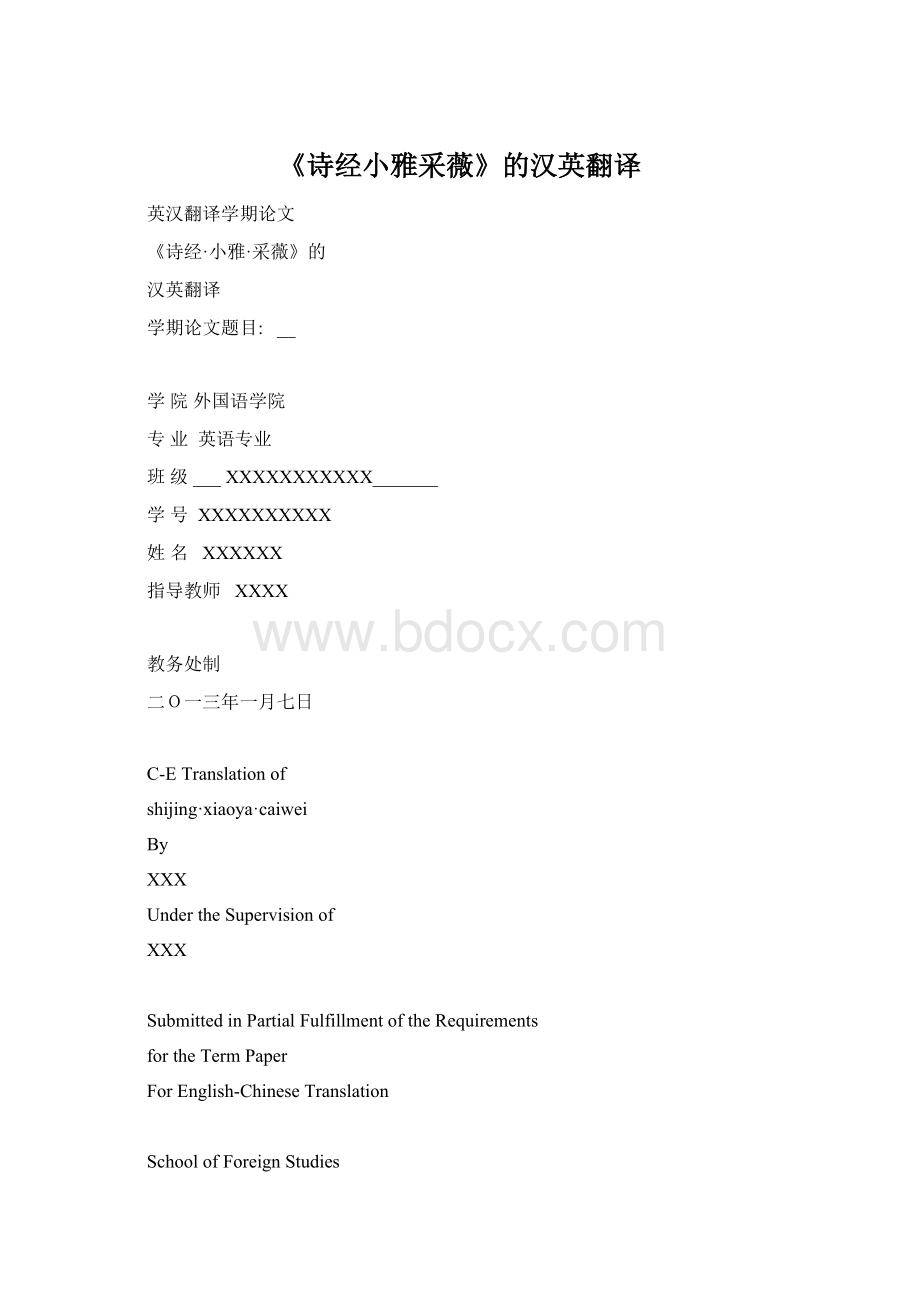《诗经小雅采薇》的汉英翻译.docx
《《诗经小雅采薇》的汉英翻译.docx》由会员分享,可在线阅读,更多相关《《诗经小雅采薇》的汉英翻译.docx(10页珍藏版)》请在冰豆网上搜索。

《诗经小雅采薇》的汉英翻译
英汉翻译学期论文
《诗经·小雅·采薇》的
汉英翻译
学期论文题目:
__
学院外国语学院
专业英语专业
班级___XXXXXXXXXXX_______
学号XXXXXXXXXX
姓名XXXXXX
指导教师XXXX
教务处制
二O一三年一月七日
C-ETranslationof
shijing·xiaoya·caiwei
By
XXX
UndertheSupervisionof
XXX
SubmittedinPartialFulfillmentoftheRequirements
fortheTermPaper
ForEnglish-ChineseTranslation
SchoolofForeignStudies
Jan.7,2013
ABSTRACT
C-ETranslationof
shijing·xiaoya·caiwei
XXX
shijingistheearliestcollectionofpoemsintheworld;caiweiisselectedfromxiaoya,andisanaulicsong.TheC-Etranslationofshijingcanbetracedbacktothe18thcentury,anduntilnow,therehasbeenmanytranslatorsbothfromChinaandabroadtranslatingit.
Thethesisisdividedintothreechapters.Chapteroneanalyzesthepoetrythroughitstheme,styleandartistry.Chaptertwodiscussesitstranslationsbypredecessors,andanalyzestheirdifferences.Chapterthreeistheauthor’spersonalopinionsonitstranslation.
Keywords:
caiwei;translation;differentversions;personalopinions
摘要
《诗经·小雅·采薇》的汉英翻译
XXX
《诗经》是世界上最早的诗集,《采薇》选自《诗经》中的“小雅”,是宫廷乐歌。
其中的“昔我往矣,杨柳依依。
今我来思,雨雪霏霏”被称为《三百篇》中最佳诗句之一。
而《诗经》的汉英翻译,可追溯到18世纪,至今已有中外数名翻译学家对其进行翻译。
本文分为三个章节。
第一个章节通过《采薇》的主题,艺术手法等对其进行分析。
第二章探讨了前辈们对其的翻译,分析不同译本的不同之处。
第三个章节是作者个人的翻译观点。
关键词:
采薇;汉英翻译;不同译本;个人观点
Introduction
Shijinghas305poems,andcanbedividedintothreeparts,feng,ya,and,song.caiweiisselectedfromxiaoya,butitalsouseoverlappingsyntacticalstructureandbixingtechniquelikeguofeng.Thispoemmainlyshowsfrontiersoldiers’livesandemotions,andexpressesdissatisfactionforthewarandlongingforhome.Thefirstthreepartssetoffthelongtimeawayhomeandthedesireforhomebythegrowthofwei,whichisveryvividandappropriate.Theforthpartshowsthesoldiers’disciplinethroughfullbloomofchangdi.Thesentence“昔我往矣,杨柳依依。
今我来思,雨雪霏霏。
行道迟迟,载渴载饥。
我心伤悲,莫知我哀!
”(“WhenIlefthere,willowsshedtear.Icomebacknow,snowbendsthebough.Long,longtheway;Hard,hardtheday.Mygriefoverflows.Whoknows?
Whoknows?
”)inthelastpartrespectivelyshowsthesceneryandtheemotionwhengoingtowarthoseyearsandwhensurvivingatpresent.Thissentenceisconsideredtobethebest-knownoneinshijingever.
TheoriginofEnglishversionsofBookofPoetrycandatebacktothe18thcentury.TheEnglishversionshavebeenapartofinternationalcommunication.TheresearchonthevariousversionsstudieshowBookofPoetryspreadintheworldaswellastheirdevelopment.(Han12)
Thereareseveralversionsofthetranslationofpredecessors,andtheyallhavetheirownstrongpoints,soitishardtojudgewhichoneisthebest.Theauthorcanonlyexpresssomesuperficialviewsbytheirformsofexpression,aromaandstyles.ThethesisdiscussesdifferenttranslationsofXuYuanchong,WangRongpei,JamesLegge,andArthurWaley.ProfessorXucalledhimselfas“书销中外六十本,诗译英法唯一人”,andhecreatedatheoryof“threebeauties”,namely,“meaningbeauty,soundbeauty,formbeauty”.Foreignscholarsandreadersallspeakhighlyofhispoetrytranslations.ProfessorWanghasmadebreakthroughprogressintermsofC-EtranslationofChineseclassicalliteratureandcomparisonbetweenChineseandWesternculturesandsoon.Heiswellupinpoetrytranslation,andholdsanideaof“要给人原诗的生动逼真的印象,需要尽可能保持原诗的风貌,也就是通常所说的以诗译诗”(Togivevividexpressionoftheoriginalpoem,andasmuchaspossibletomaintaintheoriginalstyleofpoetry,whichiscommonlyreferredtoaspoetrytopoetrytranslation).JamesLeggeisafamoussinologistinmodernEngland,andisthefirstpeoplewhostudiesandtranslatesChineseclassicssystematically.HehasmadeagreatcontributionforthediffusionofChineseConfucianclassics.ArthurWaleyisalsoafamoussinologistinUnitedKingdom.TheEncyclopediaBritannicadescribeshimlikethis:
"hewasthemostoutstandingorientalistinthefirsthalfofthe20thcentury,andalsothemostoutstandingtranslatorwhotranslatedorientallanguagesintoEnglish.........Hewasapoetandainnovatorofpoetry.Thankstohistranslations,itbecameeasierforWesternreaderstounderstandChineseliterature.”
Thisthesisisonlyatrytoexpresssomeideasoftranslatingcaiwei,andcannotbecomparablewiththemasters’work.Theauthorgivessomeviewsonthepoem’srhetoricaldevices,techniqueofexpressionanditsrhythm.Intheendofthethesis,theauthorattemptstotranslatethispoemusingthepredecessors’versionsforreference.
ChapterOne
AnalysisofCaiwei
Caiweiisapoemselectedfromshijing·xiaoya·lumingzhishi.Therearevariousversionsaboutitscreativeage.Butaccordingtoitscontentandotherhistoricalrecords,itisprobablytheworkduringtheageofZhouxuanking.Xianyun(theHuns)hadbeenverypowerful,andtheyofteninvadedtheCentralPlains,whichbroughtdisastertothepeoplelivingintheNorth.Intermsofthecontentofcaiwei,itshouldbewrittenwhensoldierscamebackfromthebattleground.Thepoemexpressessoldiers’hardlifeandtheirnostalgia.Thepoemisreproducedbelow.
采薇采薇,薇亦作止。
曰归曰归,岁亦莫止。
靡室靡家,玁狁之故。
不遑启居,玁狁之故。
采薇采薇,薇亦柔止。
曰归曰归,心亦忧止。
忧心烈烈,载饥载渴。
我戍未定,靡使归聘。
采薇采薇,薇亦刚止。
曰归曰归,岁亦阳止。
王事靡盬,不遑启处。
忧心孔疚,我行不来!
彼尔维何?
维常之华。
彼路斯何?
君子之车。
戎车既驾,四牡业业。
岂敢定居?
一月三捷。
驾彼四牡,四牡骙骙。
君子所依,小人所腓。
四牡翼翼,象弭鱼服。
岂不日戒?
玁狁孔棘!
昔我往矣,杨柳依依。
今我来思,雨雪霏霏。
行道迟迟,载渴载饥。
我心伤悲,莫知我哀!
Wegatherfernwhichspringsuphere.Whynotreturnnowendstheyear?
WeleftdearonestofighttheHuns.Wewakeallnight;theHunscausefright.Wegatherfernsotenderhere.Whynotreturn?
Myheartfeelsdrear.Hardpressedbythirstyandhungerworst.MyheartisburningforhomeI’myearning.Farfromhome,howtosendwordnow?
Wegatherfernwhichgrowstoughhere.Whynotreturn?
Thetenthmonth’snear.Thewarnotwon,wecannotrest.Consoledbynone,wefeeldistressed.Howgorgeousarethecherryflowers!
Howgreatthecaroflordofours!
It’sdrivenbyfourhorsesnice.Wecan’tbuthieinonemonththrice.Drivenbyfourhorsesalined,ourlordbefore,wemarchedbehind.Fourhorsesneigh,quiverandbowreadyeachdaytofightthefoe.WhenIlefthere,willowsshedtear.Icomebacknow,snowbendsthebough.Long,longtheway;Hard,hardtheday.Mygriefoverflows.Whoknows?
Whoknows?
(Xu182)
ThispoemiswrittenduringWesternZhoudynasty,andisthethoughtofasoldierwhoisonhiswayhomejustfromthebattleground.Anditalsoexpresseshispassionforthecountry.Thispoemdescribessuchscenery:
itwasacoldsleetingwinter,asoldierwhojustcamebackfromthebattlegroundwalkedaloneonthewayhome.Theroadwasbumpy,andthepersonwashungryandthirsty.However,homewasclose.Herecollectedthedaysofguardingfrontiers.Atthismoment,allsortsoffeelingswelledupinhismind,socameoutthispoem.
Thewholepoemhassixsections,andcouldbedividedintothreelevels.Theprecedingthreesectionsarethefirstlevel,whichisarecollectionofhisnostalgiaandanarrationofreasonsforwhycannotgohome.Theprecedingfoursentencesexpresshomesickfeelingsbyclarifyingmeaningsusingrepetitionofreduplicatedwordsandbyadvancinginregularorder.Thissentencereflectsthehardlivesoffrontiersoldiers.“Fernwhichspringsuphere”,“tenderhere”,“toughhere”depictvividlythegrowthofWei.Theyshowthelapseoftimeandthelongyearsofgarrison,aswellas“Whynotreturnnowendstheyear?
”and“Thetenthmonth’snear.”Theyhaveastrongdesireforhome,butforthereasonofgarrison,theycouldnotgohome.Thisreallymakesasoldierwithalimitedlifeworried.Thelastfoursentencesgiveareasonforwhyhecannotgohome,andthefundamentalreasonisXianYun.Thus,onehandisthelongingforhome;anotherhandistheconsciousnessforfighting.Theyaretwocontradictoryfeelingswhichconstitutethemainkeyofthepoem.
Theforthandthefifthsectionsdescribethenervouslifeofmarchingandfighting.Andtheemotionalsochangesfromdistresstoexcitement.Thepreviousfoursentencesintheforthsectionshowthesenseofpridespecifictosoldiers.Andthefollowingsentencesdescribethesceneoffightingfocusingonthechariots,andthendepictthesceneoffightingindetailfocusingonsoldiers.
Wecanseefromthecontradictoryemotionsthroughoutthepoemthatthesoldierhasastrongresponsibilityaswellasalongingforhome.Soitisverynaturaltorecallthegarrisonlifeonthelongwayhome.Themainemotionsenvelopingthewholepoemarenostalgia.Thesnowcomingunexpectedlyawakesthesoldierfromhismemoryandthentoadeepersadness.“昔我往矣,杨柳依依。
今我来思,雨雪霏霏。
”(“WhenIlefthere,willowsshedtear.Icomebacknow,snowbendsthebough.Long,longtheway;Hard,hardtheday.Mygriefoverflows.Whoknows?
Whoknows?
”)isadescriptionofscenery,andalsoanexpressionofthesoldier’snostalgia.Duringthechangesof“today”and“yesterday”,“come”and“go”,thesoldierfeelsthelapseoftime,andthenegateoflifemadebywar,thuscreatesanatmosphereofsadnessforus.“Mygriefoverflows.Whoknows?
Whoknows?
”Thewholepoemendsupwithasighoverlonelyandhelpless.
Intermsofarts,“WhenIlefthere,willowsshedtear.Icomebacknow,snowbendsthebough.Long,longtheway;Hard,hardtheday.Mygriefoverflows.Whoknows?
Whoknows?
”isconsideredtobethebestsentenceinthreehundredpoems.Thethemeissober.Thepoemislinedwithimpressivenaturalscenerydescription:
thegrowthofwei,thetenderofwei,thestrongofwei,theblossomofchangdi,thewillow,andthesnow.Herearethetruethoughtsofsoldiers,andthedistressedemotionsdonotdiminishitsvalueasapatrioticpoem.Onthecontrary,thisreflectstheplainnessofpeoplewithunderstandablethoughts.Itisthispur